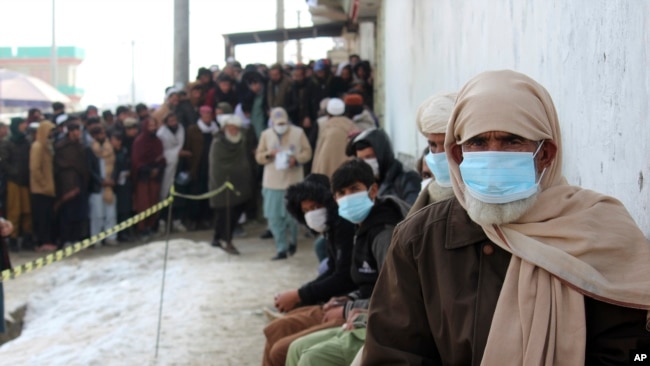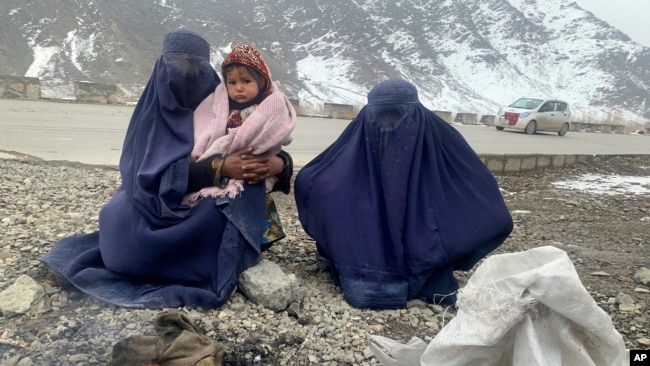ムハ(ミュシャ)のスラブ叙事詩に描かれていた民衆とこちらを見つめる暗く悲しみに満ちた瞳を思い出しました。
生活にあくせくし、オミクロン の脅威に怯える毎日。
でもこれが同じ世界で起きていること。
心が深く沈むのを感じます。何もできないことへの悲しみ。
凍てつくような寒さの中、アフガニスタン人への援助が急がれる(和訳)
Aid Workers Rush to Help Afghans in Freezing WeatherJanuary 30, 2022
January 30, 2022
国連は今年、アフガニスタンで食糧やその他の援助を極度に必要としている数十万人の人々を支援しようとしています。同国では厳しい冬の天候が、タリバン指導下の経済危機の深刻化に拍車をかけています。
グルナズさんは苦しんでいる多くのアフガニスタン人の一人です。28歳の彼女は、同国東部の交通量の多い道路沿いの岩場に座って、見知らぬ人に助けを求めています。
彼女は一人ではありません。腕には1歳半の息子が抱えられています。毛布と小さな火だけで暖をとっています。妹のカリダさんも一緒にいます。
時々、運転手が立ち止まって、彼女にお金をくれます。彼女は、カブールとロガー州の州都プルエアラムを結ぶ70キロの道路で一日中待っています。
グルナズさんは、以前は1日に3ドル近くもらったことがありますが、普段の合計ははるかに少ないといいます。
アフガニスタンは、8月にタリバンが政府を打倒したとき、すでに苦境に立たされていました。国際機関は、過激派政府がそれを悪用するのではないかという懸念から、同国への数十億ドル相当の援助プログラムを停止しました。国連によると、政権奪取以来、50万人以上が職を失ったといいます。
アフガニスタンの人口3800万人のうち、約90%が援助に依存していると推定されます。国連によれば、300万人近くが戦争、飢餓、悪天候によって故郷を追われ、自国内で避難生活を送っているということです。
2020年だけでも70万人のアフガニスタン人が避難民となり、その多くが公園のような公共の場で生活しています。
アフガニスタンにおける世界食糧計画(WFP)の広報担当者は、この問題を "悲惨 "と表現しました。シェリー・タクラルさんによると、国連機関は今年、アフガニスタンの人々を支援するために26億ドルを必要とするといいます。彼女はアフガニスタンでのWFPの活動を "時間との戦い "と呼びました。
国連は最近、アフガニスタンを支援するために50億ドルの資金を要求しました。
グルナズさんは、靴職人の夫と一緒にクンドゥズで暮らしていました。しかし、彼のビジネスは戦乱とタリバンによる乗っ取りを生き延びることができなませんでした。そこで、グルナズさんはロガーに移りました。
彼女は、家を暖める方法がなく、彼女と妹は毎日同じ場所で、運転手が止まってお金をくれるのを待つことになると言っています。
プル-エ-アラムでは、1月と2月には最低気温がマイナス6度まで下がることもあります。それでも、何千人もの人々がWFPの小麦粉、油、塩、豆を集めるために寒さの中で待っているのです。
世界食糧計画は、市内で最も困っている人を探し、食料引換券を渡しました。しかし、食糧配給を聞きつけた他の人々が書類を持たずにやってきたため、このシステムは崩壊してしまいました。彼らは喧嘩を始め、治安部隊が秩序を保つために関与しなければなりませんでした。
WFPのフサイン・アンディシャによると、1月の1週間に1日あたり500世帯に食料を配りました。彼は、人々は "絶望的 "であると述べています。
彼が記者と話をしていると、4人の女性が食べ物を求めてやってきました。そのうちの一人は、夫が麻薬中毒者だといいます。
「どこにいるのかわからない。子供たちの食べ物もない。お願いです、何か欲しいんです」と、その女性は言いました。
国連によると、アフガニスタンでは薬物依存の問題が深刻化しているといいます。同国では毎年、強力な麻薬であるアヘンを300万キログラム以上生産しています。国連によれば、3800万人のアフガニスタン人のうち、約100万人が薬物中毒になっていると推定されています。
女性たちは皆、家族にはお金がないと言います。別の女性は、夫が仕事を見つけることができる日は1日1ドルしか稼げないと言いました。
アンディシャさんは、WFPが毎月何千もの家族に食糧を供給しているにもかかわらず、プル-エ-アラムの状況は悪化していると語っています。
タリバンが政権を取り戻した今、人々には仕事がなく、女性も働くことが許されなくなったと言います。
しかし、アンディシャさんは、タリバンがWFPが食糧を配給している場所の警備を助けていると言いました。
WFPの広報担当者であるタクラールさんは、食糧プログラムに寄付をする人は、この組織が政府から切り離され、国民が直接援助を受けることを忘れてはいけないと述べています。
"人々が第一 "であることを、この人道的危機において忘れてはならないことだといいます。
Aid Workers Rush to Help Afghans in Freezing Weather
The United Nations is trying to help hundreds of thousands of people in critical need of food and other aid this year in Afghanistan. Severe winter weather in the country is adding to a growing economic crisis under Taliban leadership.
Gulnaz is one of the many suffering Afghans. The 28-year-old sits on the rocky ground along a busy road in the eastern part of the country. She asks for help from strangers.
She is not alone. In her arms, she holds close her 18-month-old son. A blanket and small fire is all they have to stay warm. She is also joined by her sister Khalida.
Sometimes a driver will stop and give her some money. She waits all day along the 70 kilometer road between Kabul and Pul-e-Alam, the capital of Logar province.
Gulnaz says she has gotten close to three dollars in a day before, but the usual total is far lower.
Afghanistan was already struggling when the Taliban overthrew the government in August. International agencies suspended billions of dollars worth of aid programs to the country over concerns that the extremist government would misuse it. The U.N. says more than a half-million people have lost their jobs since the takeover.
It is estimated that about 90 percent of Afghanistan’s 38 million people are dependent on aid. The U.N. says nearly 3 million there are displaced in their own country, driven from their homes by war, hunger and severe weather.
In 2020 alone, 700,000 Afghans became displaced, many living in public places like parks.
The spokeswoman for the World Food Program (WFP) in Afghanistan, called the problem “dire.” Shelley Thakral said the U.N. agency will need $2.6 billion to help the people of Afghanistan this year. She called the WFP effort in Afghanistan “a race against time.”
The United Nations recently asked for $5 billion to help Afghanistan.
Gulnaz had lived in Kunduz with her husband, a shoemaker. But his business did not survive the warring and takeover by the Taliban. So, Gulnaz moved to Logar.
She said there is no way to heat her home and she and her sister end up in the same place each day waiting for drivers to stop and give them money.
In Pul-e-Alam, temperatures in January and February can drop to lows of minus-6 degrees Celsius. Still, thousands of people wait in the cold to collect WFP flour, oil, salt and beans.
The World Food Program searched for the neediest people in the city and gave them food vouchers. However, the system broke down when others heard of the food giveaway and came without the papers. They started fights and security forces had to get involved to keep order.
Hussain Andisha of the WFP said the group gave food to 500 families per day during one week in January. He said people are “desperate.”
As he talked with reporters, four women came by asking for food. One said her husband is a drug addict.
“I don’t know where he is. I have no food for my children. Please I need something,” the woman said.
The U.N. says drug dependence is a growing problem in Afghanistan. The nation produces more than 3 million kilograms of the powerful drug opium each year. The U.N. says it estimates about one million of the 38-million Afghans are addicted to drugs.
The women all said their families have no money. Another woman said her husband earns only $1 per day on the days he can find work.
Andisha said the situation is getting worse in Pul-e-Alam even as the WFP gives food to thousands of families per month.
He said people have no jobs and women are no longer permitted to work now that the Taliban is back in power.
Andisha did say, however, that the Taliban is helping with security at places where the WFP is giving out food.
Thakral, the agency spokesperson, said anyone who gives money to the food program should remember that the organization is separate from the government and the people get the aid directly.
“People come first,” she said, “and that’s important to remember in this humanitarian crisis.”
Words in This Story
dire– adj. very bad, or causing great fear or worry
desperate – adj. very sad or upset; a feeling of having little hope
voucher – n. a document that gives you the right to get something without paying for it
addict – n. a person who is not able to stop using drugs

